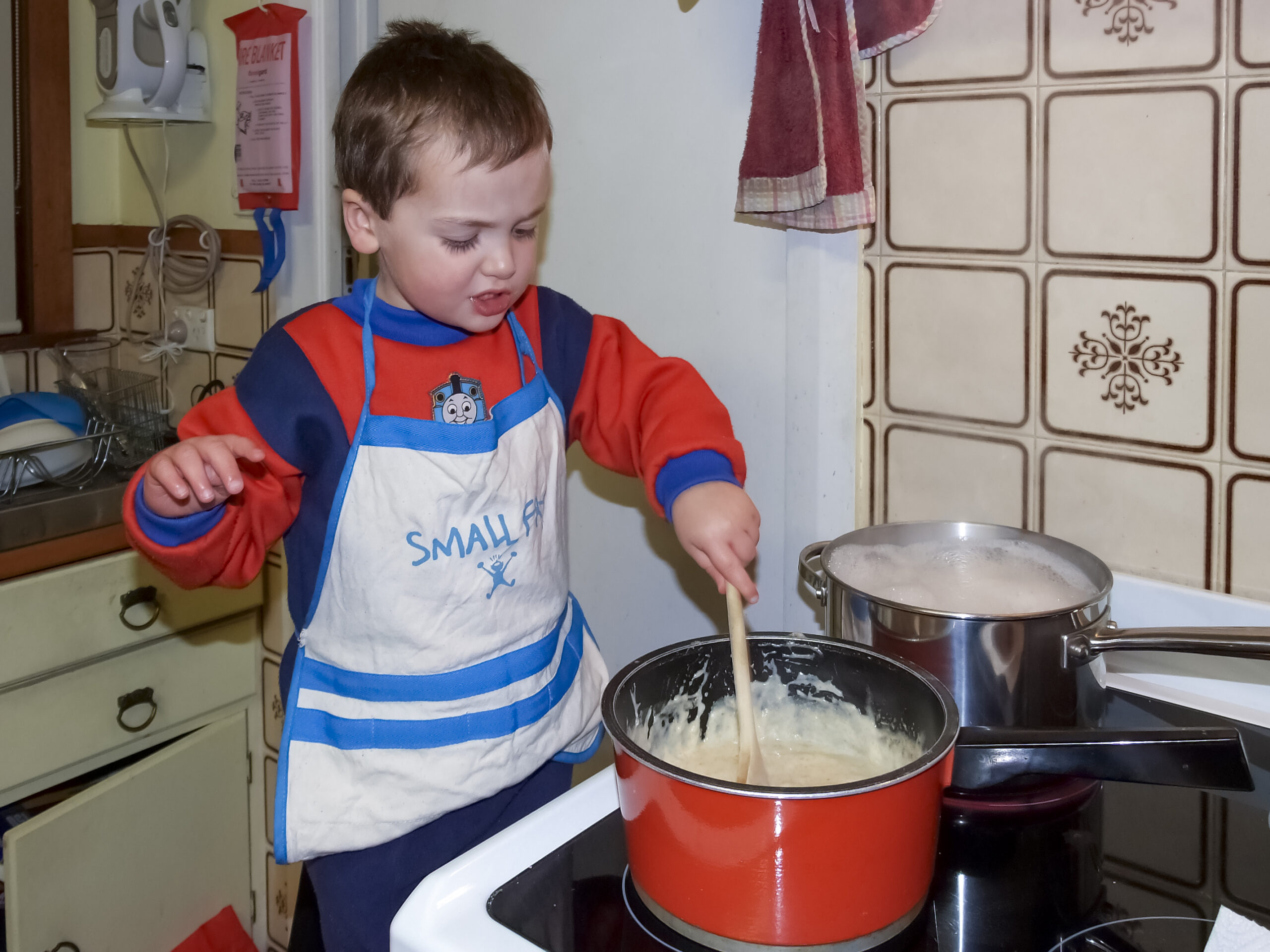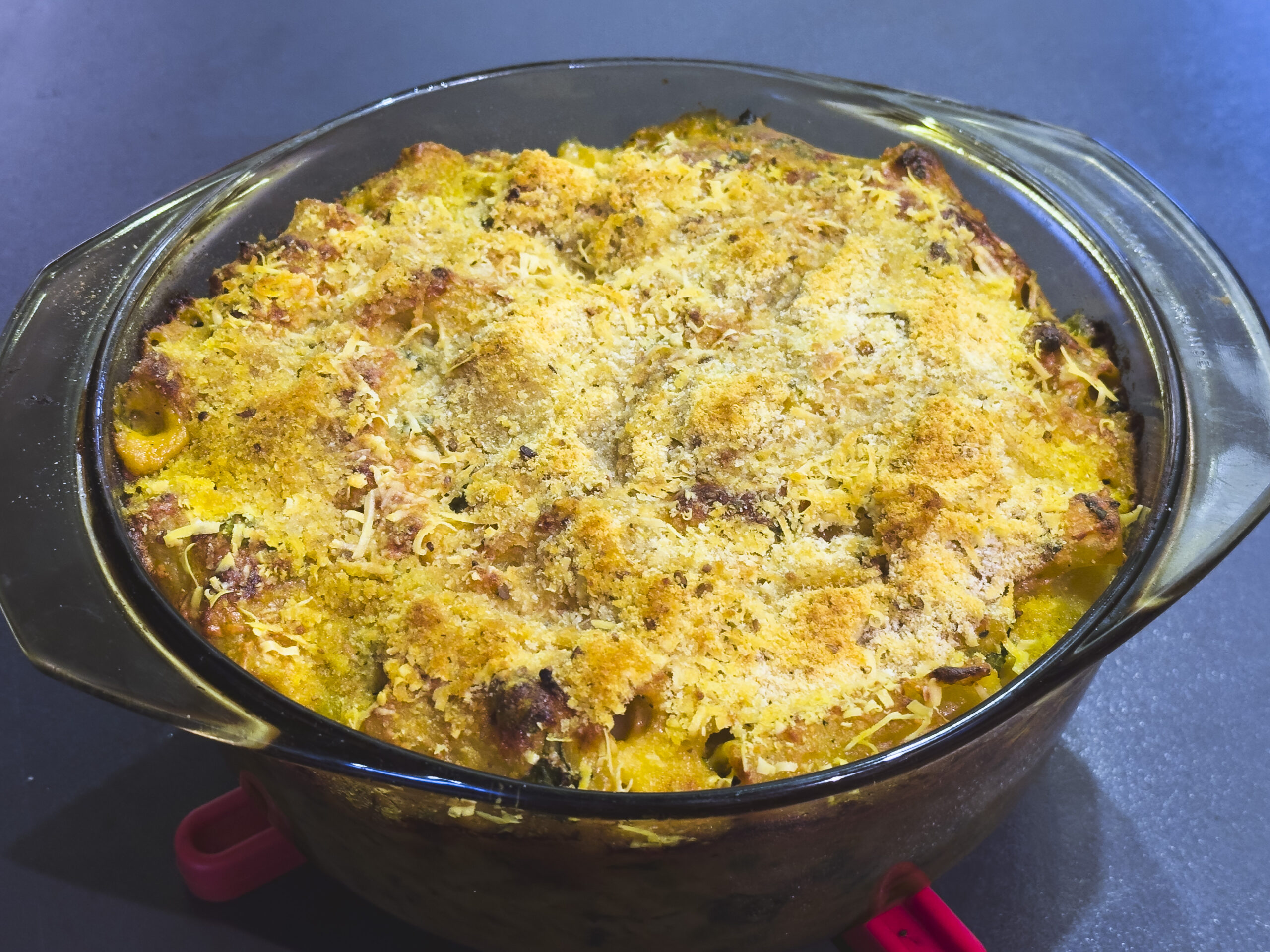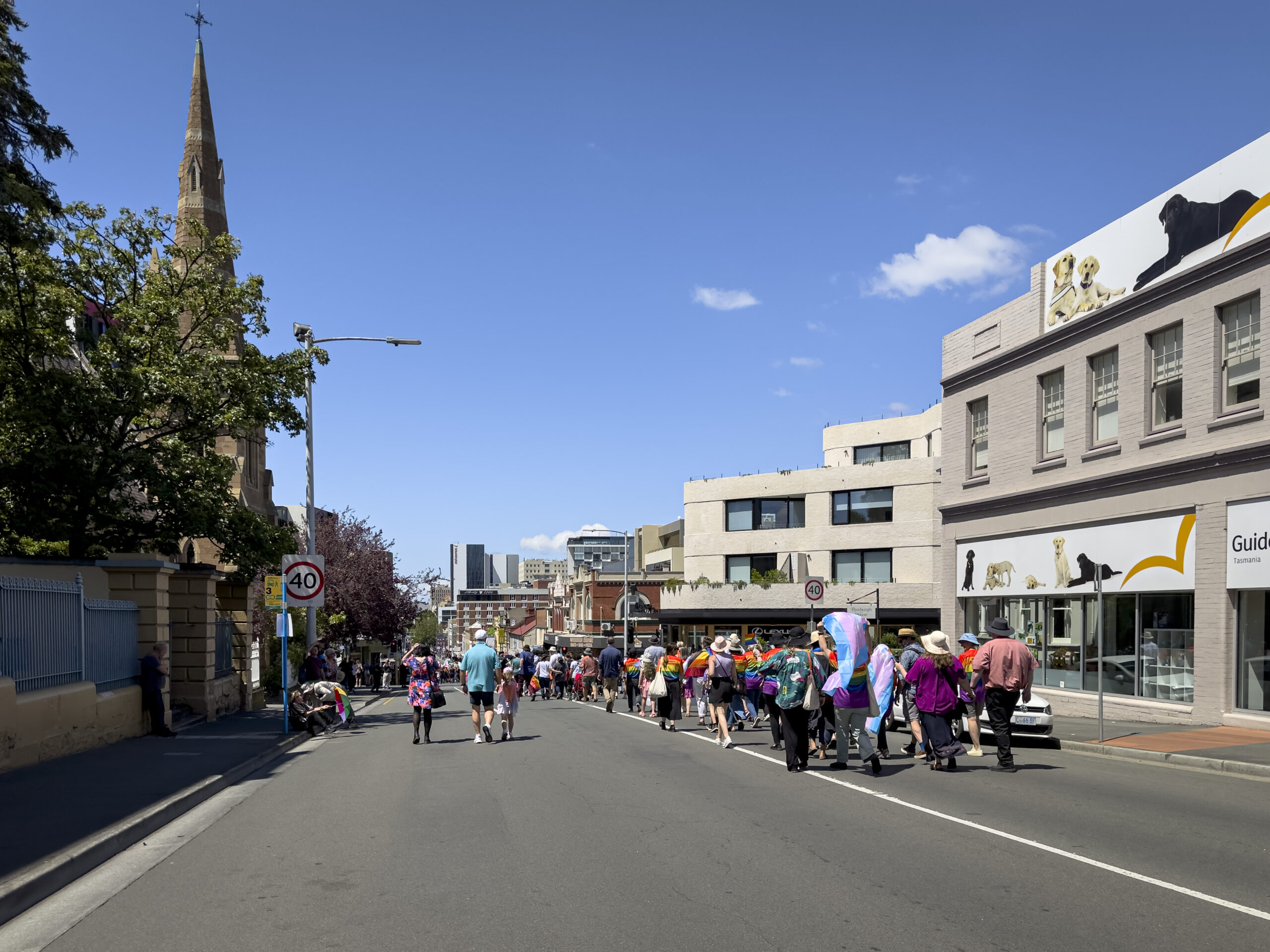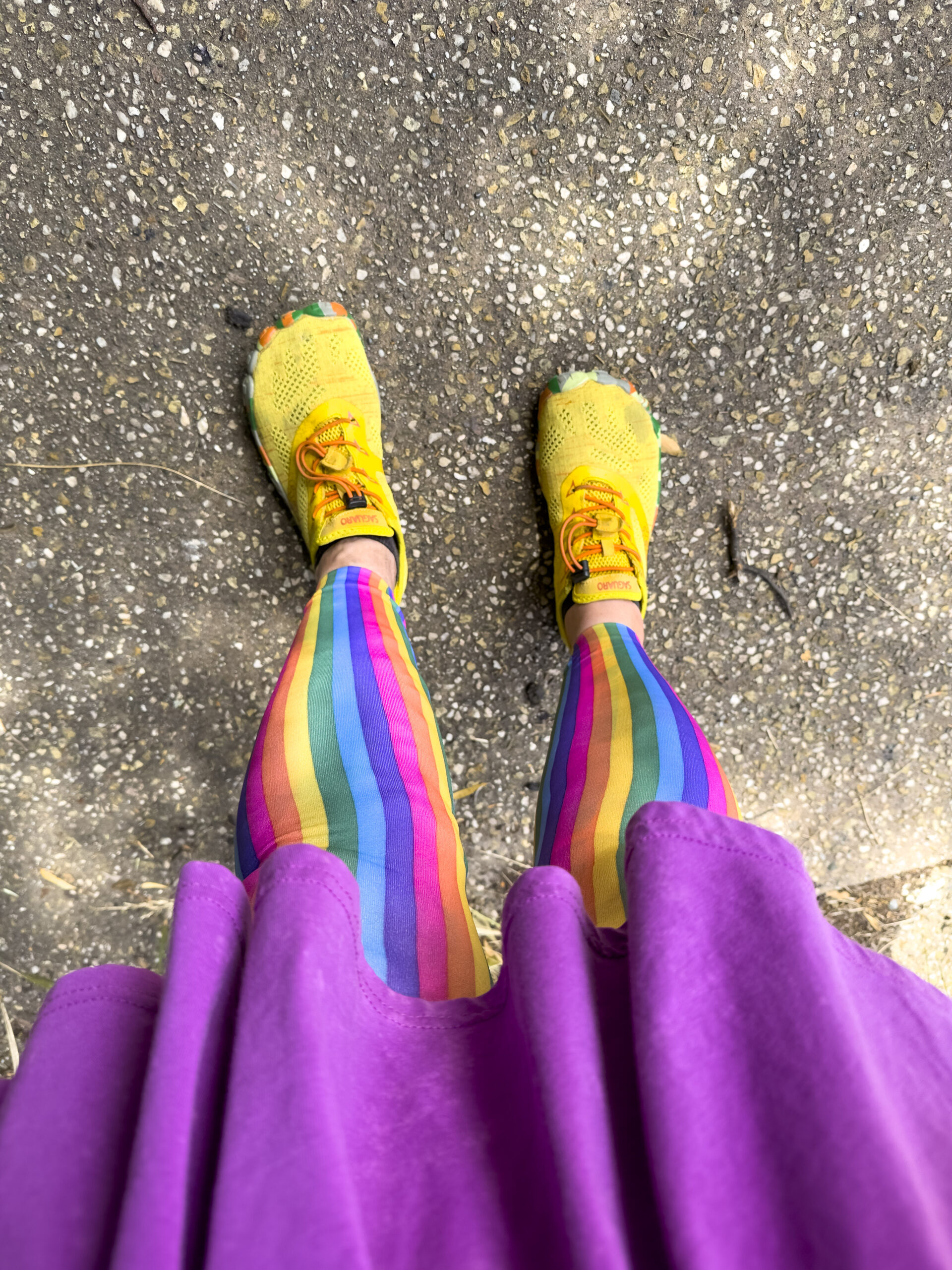Week 05/2024: Cheese and noodles
Week of 27 January 2025
This Sunday was the last day I got to cook mac and cheese aka cheese and noodles (or was it cheesy noodles?) for Kramstable. (If you’ve been reading along, Kramstable is about to leave home to go to university in Melbourne. It’s been a difficult period of change to navigate. But here we are. As I’m putting the finishing touches to this post, he’s sorting out some final things, and the clock is ticking down to the time we leave for the airport.)
Cheese and noodles—the final time
Way back in the days before Kramstable was at school, before the amazing hair, before his passion for food and before he learned to cook, he was a fairly typical small child who wasn’t a huge fan of vegetables. I, of course, as the “how is this child going to stay alive and learn to nourish himself if he eats a single slice of white bread or McDonald’s burger and doesn’t eat any vegetables” mother who kept putting myself down for every perceived failing as a parent, fretted about this constantly.
“Look at that photo of smiling kids growing vegetables and eating them right out of the garden. Why won’t my kid eat vegetables? WHAT HAVE I DONE WRONG?”
By the way, this mother guilt is something that will pervade every element of your life if you let it. It’s exhausting and, for the majority of kids, most things you fear happening if you aren’t a perfect parent won’t happen and, even if they do, they won’t be that bad. It’s easy to say in hindsight and hard to believe in the moment when you don’t know what’s going to happen—which is true of many things—but it’s not a good way to be. If you can chill out a bit more, this parenting gig, which you probably don’t feel remotely qualified for, may feel a little less hard.
Back to the food.
Veggie smuggling
After many google searches, I discovered a practice of smuggling vegetables into dishes that normally don’t include a lot of vegetables in the hope that you can trick your little person into eating them. (There are people who swear by this and others who say you shouldn’t do it because it doesn’t teach kids what vegetables should taste like and won’t make them eat them once they have grown out of smashed up food. Take your pick. You’ll be wrong whichever one you do.)
The idea is to purée cooked vegetables that are the same colour as the food you’re eating so you can hide them in sauces and soups and the like. One of the suggestions was puréed cauliflower in mac and cheese.
A diversion. Apparently, some cultures believe mac and cheese is a side dish. This is incorrect. Mac and cheese is, and has always been, a main meal. The debate is closed.
I can’t remember if Sunday mac and cheese night came before the puréed cauliflower idea or if it was born out of it, but at some point “cheese and noodles” became dinner for me and very small Kramstable. (Slabs, disliking this as a dish, opted out and chose to make his own dinners.) My original recipe was, as far as I can remember, a basic white sauce, with lots of cheese, mixed with some kind of small tubular pasta, and topped with crushed Weetbix, because that’s how my mother used to make it.
The cauliflower went into the sauce, obviously. That was not something my mother ever did.
At some point after Kramstable started school, I had the genius idea of cooking a big batch meal on Sundays instead of mac and cheese, which he could take to school in a thermos every day for lunch. Whether this was because I was sick of making sandwiches or he was sick of eating them I don’t recall. But after that, mac and cheese was reserved for school holidays.
Mastercheeseandnoodles
Moving on from there, one year Masterchef had a mac and cheese challenge, resulting in a glut of fancy recipes far more sophisticated than my mum’s recipe. Kramstable was very keen to try some of these, so we started to change it up a bit. There was chilli mac and cheese, ‘triple hog’ mac and cheese, a version we found on the internet made with apples and apple cider, and another one with pancetta and basil.
Somewhere in here, Kramstable developed his own recipe, which was, ironically, chock-a-block full of vegetables.
We even came across a story from HoneyChild, Toni, who told us about James Hemings, a former slave later trained as a French chef, who is credited with bringing mac and cheese to the USA. Her version of Hemings’ recipe was also added to the mix.
The mac and cheese ritual has been something we’ve been doing for, I reckon, 15 years now. The first photo I can find is from August 2010, where an almost four-year-old Kramstable is stirring a pot of cheese sauce. (Yes, he used to help!)

But, with Kramstable moving out next Saturday, this Sunday was the very last time I made mac and cheese for him. After a chaotic Masterchef ‘triple hog’ cook last week, for his last time, he chose his own recipe, which we had recently improved by roasting the sweet potatoes.
I made it on Sunday, wanting it to be as best as I could do to farewell a dish that has been such a big part of our lives.

I hope he enjoyed it.
Summary of the week
What did I learn this week?
I learned many things this week but for my pick of the week it was hard to go past APOPO’s search and rescue rats. These rats are trained to wear little backpacks and go into disaster areas where humans can’t go looking for survivors and alerting the rescuers where the people are.
They are GIANT rats, and the first thing I thought of when I saw this was the ROUS from The Princess Bride.
APOPO also trains giant rats to detect landmines, which is their primary work. The search and rescue rat program is a relatively new part of what they do.
Cool.
Totally unrelated, I also learned not to have a vaccination in the arm of the side you usually sleep on.
What did I notice this week?
Light on the top of the mountain.

What was the best thing this week?
I went with some colleagues from my work’s LGBTIQA+ employee reference group to the Pride flag raising at Town Hall on Friday, followed by the Pride March on Saturday. It’s all about celebrating the LGBTIQA+ community, and for people to be able to be visible and seen and accepted for who they are.

These events kicked off Pride Month and the TasPride Summer Festival.
TasPride is a LGBTIQ+ community organisation, which “aims to support, unite, champion and celebrate Tasmanian LGBTQ lives, families, goals, achievements, culture and love”. It does fantastic work with the community and it was fantastic to see so many people out supporting them on the weekend. I wrote a bit about them in this post about the Artfully Queer exhibition in 2023 (and yes, the treasurer’s name was Vincent).
Hobart’s Lord Mayor Anna Reynolds spoke at the flag raising event about Hobart Council’s work in supporting the LGBTIQA+ community, including the council’s new community reference group. She spoke about how important this work is at a local level, given unfolding events overseas and even in parts of this country. And I shall say no more because it is pointless to try and promote acceptance and understanding with people who just scream “woke radical leftist” every time you open your mouth. Because apparently now, caring about people and respecting them is radical. And the “anti-woke” lobby won’t listen and they don’t want to understand, and I don’t know how to deal with that.
It breaks my heart that people continue to be mocked, ridiculed, harassed, marginalised, discriminated against and harmed because of who they are or who they love.

We had a great time at the march and looked amazing in our t-shirts that one of our colleagues had designed especially for this day.
I was a little disappointed that the cool skirt I’d ordered didn’t arrive in time but there’s always next year for that and I had fancy rainbow tights instead.

What am I reading this week?
I’m not reading anything again this week.
No, this is not strictly true. I read Shylock’s monologue from The Merchant of Venice in my Alexander Technique class.
As I was reading, I felt you could substitute the word ‘Jew’ for many other characteristics and send it to certain individuals who profess to be Christians. But these are not people who will listen to reason.
Here’s the part that struck me as particularly relevant.
Hath not a Jew hands, organs, dimensions, senses, affections, passions? Fed with the same food, hurt with the same weapons, subject to the same diseases, healed by the same means, warmed and cooled by the same winter and summer, as a Christian is? If you prick us, do we not bleed? If you tickle us, do we not laugh? If you poison us, do we not die?
I know the context this text is taken from is quite different, but Shakespeare’s words, written over 400 years ago, apply right now to many, many people.